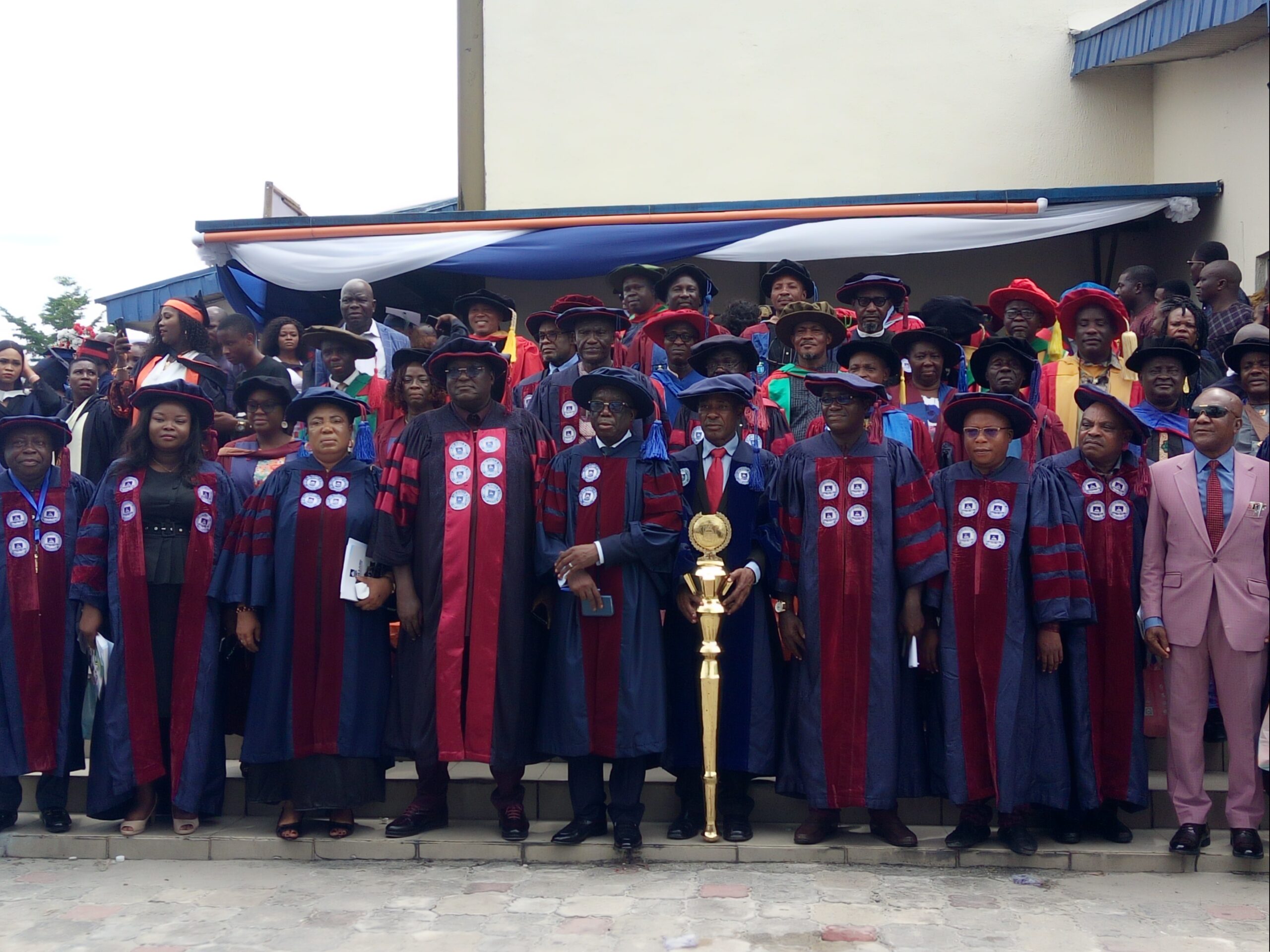Education
Aluko Explains Students’ Poor Performance In National Exams
A renowned economist, Prof. Sam Aluko, has blamed students high rate of failure in national examinations on the privatisation of the education sector by the government.
Speaking at the ongoing education summit convoked by the Ekiti State Government in Ado-Ekiti, he said government at all levels erred in hearkening to the advice of the international agencies over the outright privatisation of the education sector.
Aluko, who chaired the occasion, also considered the incessant industrial strike being witnessed in Nigerian schools as one of the debilitating factors affecting the sector.
He posited that it was wrong for the government to have committed a pivotal sector like education in the hands of the private bodies.
Aluko said the privatisation policy had constituted a serious menace to the struggle for academic excellence by students, which he said, was partly responsible for the failure being recorded in the examinations conducted by the West African Examinations Council (WAEC) as well as other national and international examination bodies in the country.
He decried the poor performance of students from Ekiti State in the various examinations being undertaken by them, noting that the state had produced the best brains in all fields of endeavour in the country.
Aluko declared: “From primary education to tertiary education level, indiscipline, immorality and strike have crippled the education sector. Govenment says it is privatising the education sector, but where are the committed private investors in the sector today in the country?
“If you train an engineer and he has no job to do, you are indirectly training an armed robber; because he knows how to use the tools to open your doors in the night.
“To me, it is better not to train the students at all than to train them and allow them to remain jobless.”
In his keynote address, Prof. Akin Oyebode, a professor of law and former Vice-Chancellor, University of Ado-Ekiti (UNAD), noted with regret that no Nigerian University was ranked among the best 200 across the world due to poor performances.
He commended the state government for the initiative, saying the summit would help the relevant stakeholders in the education sector to resuscitate the dwindling fortunes of the sector in the state.
He explained that education takes pre-eminence in the scheme of things in any nation, saying that it was highly regrettable that even in Africa, the best Nigerian university was ranked 34th.
Education
Former VC Advocates Drug Test For University Lecturers

Prof. Muhammad AbdulAziz, the immediate past Vice Chancellor of Abubakar Tafawa Balewa University (ATBU), Bauchi state, has advocated drug tests for lecturers to sanitise the university system.
Mr AbdulAziz stated this in a valedictory speech to the Senate of the University at a handing-over ceremony to his successor, Prof. Sani Kunya, the new acting Vice Chancellor of the institution.
While commending the decision by the Federal Ministry of Education to introduce drug tests for students seeking admission to all universities, he said such tests should be extended to lecturers.
According to him, it would further sanitise the university system and promote sanctity and academic excellence.
“We have discussed with the Federal Ministry of Education and they want to introduce to all universities that before any student would be registered in the universities, he or she must undergo drug tests.
“If students should undergo drug tests, I believe that even some of us, the lecturers, need to undergo the same test so that we know our status.
“We also have to volunteer ourselves to have this test done on us because we have to sanitise the university.
“If the students are to be subjected to drug tests to determine their mental health status, nothing is wrong if the lecturers too are subjected to the same test.
That is the only way to check excesses in the university system,” he said.
Mr AbdulAziz said the modest achievements recorded during his tenure were in the areas of infrastructural development, academic content development and community services.
He said the achievements recorded could not have been made possible without the support of all stakeholders in the system.
He appreciated the federal government for the support rendered to the University through the Federal Ministry of Education and its various agencies like the National Universities Commission and the Tertiary Education Trust Fund.
Read Also:Students to undertake drug test before admission UniAbuja
Also speaking, the new acting VC of the university expressed gratitude to the Senate for finding him worthy of the honour and to the federal government for his confirmation.
“I want to assure you that I will justify the confidence reposed in me by not disappointing you all.
Education
Don Seeks 20%Increased Budget Allocation To Education

A Professor of Economics in the Faculty of Social Sciences University of Port Harcourt, Rivers State, Prof Willie J. Okowa has called on government at all levels to increase her Education sectorial budgetary allocation to twenty percent of their annual budget , saying that such efforts will improve the development of education in the country.
Okowa said each government wether local, state or federal governments should devote an increased proportion of her annual budget to education such that in the next five to ten years , so that we can see at least 20 percent of her budget to the education sector.
He made this call while presenting the 42nd convocation lectures at the just concluded Iaue convocation ceremonies held at the university auditorium in port harcourt, recently.
He posisted that the economy has a nexus with sustainable higher education to the effect that a robust economy plays a key role in the sustainability of higher .education , while a sustainable higher education plays a supportive economic growth and development
“On the hand,a failing economy can hardly support a sustainable higher education”.
According to him ,a growing economy easily provides the finances to fund sustainable higher education while a education provides the relevant skills and the manpower needs required to propel economic growth and development,”of course, The Inadequate provision of higher educational facilities will fail to the manpower needs required by the economy to support its growth and development”
“The ability of an economy to adquately find higher education also depends on the rate of the population ,the higher the rate of growth of population, the more the number of the people that require higher education .Hence ,a rapid population growth puts more pressure on the ability of the economy to adquately fund higher education, irrespective of its performance.”
“Population growth , economic growth and the adequate funding of higher education are therefore intricately interlinked.The adequacy of the funds that an economy provides to finance higher education also depends on how well the managers of our education institutions manage such funds.
If people who lack character , integrity and merit are appointed to helms of affairs institutions,then funds can hardly be adequate .on the other hands ,if people of character, integrity and merit are given such appointments ,then the outcome will be much better” he stated.
The erudite scholar opined that Nigerian universities and colleges are also passing through strange times and outlined outdated laboratories , inadequate classrooms, adding that many students involved in drugs and prostitution.
By: Akujobi Amadi
Education
Bauchi Govt Threatens To Revoke Scholarship Of Unserious Students

The Bauchi State government has cautioned that it will cease payment of external exam fees for Senior Secondary Three, SS3 students found skipping classes.
Commissioner for Education, Jamila Dahiru gave the warning in Bauchi during her school resumption inspection and monitoring visits to some schools on Wednesday.
The Tide’s source recalls that Governor Bala Mohammed earlier allocated N396.9 million for the 2023/2024 external exams of 14,170 students in public schools.
The external examinations paid for included the West African Examination Council, WAEC, the National Examination Council l, NECO, National Board for Arabic and Islamic Studies (NBAIS) and the Joint Admissions and Matriculation Board, JAMB.
However, the Commissioner, who was furious with the low level of attendance of especially the SS3 students in some schools, recounted how she met less than 20 percent of the SS3 students who were around when she visited a particular school.
She stressed the need for students to return to class and prepare diligently, threatening to revoke scholarships for ‘unserious ones.’
Her words: “We just realised that most of these students, after being taught from JSS1 to SS3 and with Gov. Bala Mohammed paying for their external exams, and as soon as they were done with their mock exams, they left school and won’t return until the first day of their external exams.
“It is sad to acknowledge that we are not responsible as parents because I want to believe that they have parents who are seeing them attending schools simply because they are getting ready to just write their external examinations.
“We want to make them come back to class, we want to emphasize that we are investing in the right people because it is just telling us that it is the government that bothers about their education while they don’t care and probably their parents that are allowing them to stay at home also do not care.
-

 News3 days ago
News3 days agoFubara Tasks GPDA On Prosperous, Liveable City
-

 Environment3 days ago
Environment3 days agoWED:Activists Task Govt On Plastic Pollution, Synophom Ban
-
Business3 days ago
NCDMB, SON Maintain Lead In Business Efficiency Ranking
-

 Niger Delta3 days ago
Niger Delta3 days agoEdo: PDP Unveils 200-Member Campaign Council For 2024 Poll
-
Sports2 days ago
Chess Championship: Dan-Jumbo Emerges Best Female Player
-

 Foreign3 days ago
Foreign3 days agoPolice Detain Scores Of US Varsity Students Over Protest
-

 Oil & Energy3 days ago
Oil & Energy3 days agoRenewable Energy Boom With Waste Problem
-

 News3 days ago
News3 days agoNAF Strikes Terrorists In Niger, Economic Saboteurs In N’Delta

